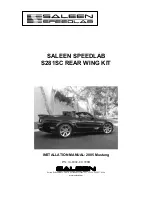
signed seating positions with passengers, the motorhome could be overloaded.
Please use the Recreational Vehicle Industry Association’s fi gures shown below to
help you to determine your weights.
• Average vehicle occupant = 154 pounds
• One gallon diesel fuel
= 6 lbs
• One gallon of water
= 8.3 lbs
• One gallon of LP gas
= 4.2 lbs
The operator is responsible for analyzing the conditions in which the motorhome will
be utilized for each trip. The number of passengers and placement of cargo can af-
fect the amount of water capacity that you carry. A smaller passenger capacity
for camping provides reasonable cargo capacity for trips taking more than one day.
A larger passenger capacity for day use provides less cargo capacity for trips or
activities not involving overnight stays. It may be necessary to reduce the amount of
water carried and unload some cargo items normally carried for camping in order to
provide carrying capacity for the additional day use passengers.
1. Drive the front wheels onto the scale platform and take a reading. This is the
front Gross Axle Weight. (Reading 1).
2. Drive the entire vehicle (all axles) onto the scale and take a reading. This is the
Gross Vehicle Weight. (Reading 2).
3. Drive forward until only the rear axle is on the platform and take a reading. This
reading is the rear Gross Axle Weight. (Reading 3).
4. Compare reading 2 with the GVWR (Gross Vehicle Weight Rating) of your
vehicle located on the Federal Certifi cation Label. If the reading exceeds the
GVWR rating, you will have to reduce the total vehicle load.
5. Check readings 1 and 3 to verify that each is less than the GAWR (Gross Axle
Weight Rating) on the certifi cation label. If either exceeds the GAWR for the
axle(s), redistribute enough of the load to ensure that loads on the front and
rear axle(s) are within the required limit.
Do not exceed the gross axle weight ratings of any axle.
Do not exceed the maximum hitch weight rating.
Do not exceed the gross vehicle weight rating of either
the motorhome or the towed vehicle. Do not exceed the gross combined weight rat-
ing of the motorhome. Exceeding any of these ratings may cause unstable driving
and handling characteristics, damage to your motorhome chassis or towed ve-
hicle and may void your warranty protection.
GROSS COMBINED WEIGHT RATING (GCWR): is the maximum loaded
weight of this motorhome and any towed trailer or towed vehicle. See the
Chapter 2 - Planning and Preparation
WEIGHING
YOUR LOADED
MOTORHOME
Reading 1
Reading 2
Reading 3
Summary of Contents for Astoria 2006
Page 1: ...Owners Manual ...
Page 10: ...Introduction ...
Page 58: ...Chapter 8 Exterior Systems ...
Page 76: ...Chapter 10 Winter Use and Storage ...
Page 82: ...76 Notes ...
Page 83: ...77 Notes ...
Page 84: ...78 Notes ...
Page 85: ...79 Notes ...
Page 86: ...80 Notes ...
Page 97: ...91 Electrical Diagrams ...
Page 98: ...92 Electrical Diagrams ...
Page 99: ...93 ...
Page 100: ...94 Electrical Diagrams ...
Page 101: ...95 Electrical Diagrams ...
Page 102: ...96 Electrical Diagrams ...
Page 103: ...97 Electrical Diagrams ...
Page 104: ...98 Electrical Diagrams ...
Page 105: ...99 Electrical Diagrams ...
Page 106: ...100 Electrical Diagrams ...
Page 107: ...101 Electrical Diagrams ...
Page 108: ...102 Electrical Diagrams ...
Page 109: ...103 Electrical Diagrams ...
Page 110: ...104 Electrical Diagrams ...
















































